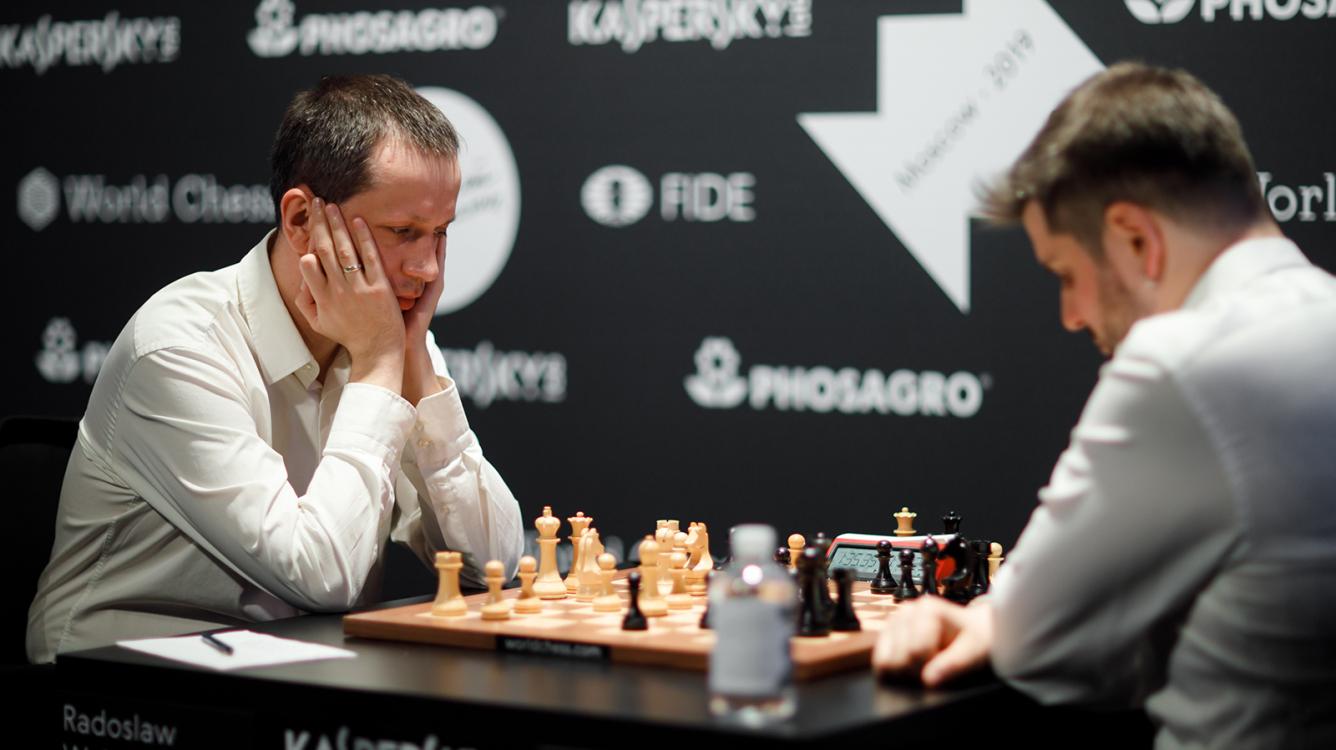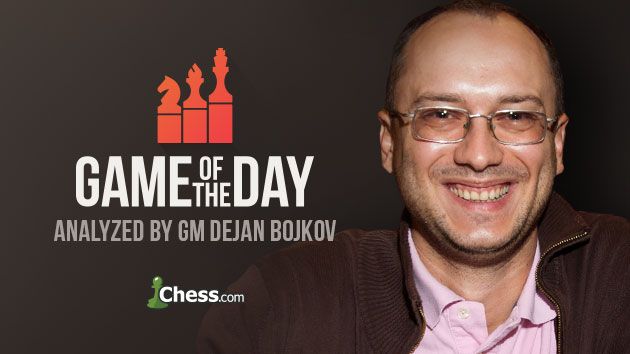
Wojtaszek Knocks Out Svidler From FIDE Moscow Grand Prix
After kicking out Shakhriyar Mamedyarov, Radoslaw Wojtaszek also eliminated Peter Svidler from the FIDE Grand Prix in Moscow. The other three quarterfinal matches went into tiebreaks.
There was little excitement on the first day of the Grand Prix's second round, with all four games ending in draws under 32 moves and with not much happening on the boards. Luckily, the second day was much more interesting.
Despite the fact that we had only half the games, the number of tiebreak matches tomorrow will be higher than in the first round: three vs. two.
Wojtaszek-Svidler, 1.5-0.5
The first game between Svidler and Wojtaszek was perhaps the most disappointing of them all, as except for two pawns, all pieces were still on the board when the hands were shaken on move 28. In fact, that pawn trade (15...cxd4) had been Black's only move on the enemy's side of the board!
As it happens sometimes, both players didn't like their position very much at the end.
"I think I misplayed something in my prep and I thought that I am worse," said Wojtaszek.
Svidler: "At some point I thought I was getting somewhere but in the final position it was very difficult for me to understand what my plans are. I just thought I’ll ask Radek what he thinks about the position."

One Norwegian grandmaster wasn't too thrilled about what happened here.
Fide GP allowing draw offers was a bad call.
— Jon Ludvig Hammer (@gmjlh) May 20, 2019
The next day the fans were more than compensated; not only did the game last much longer, but it also ended decisively. In a sharp Saemisch Benoni/King's Indian, Svidler played an interesting exchange sacrifice but didn't follow up well, and then got outplayed.
Wojtaszek: "After 25...Rxb3 I felt one of us was going home and I was simply praying that it won't be me!"
Here Svidler sacrificed an exchange with 25...Rxb3.
"I think the exchange sacrifice is interesting, at least," Svidler said. "Maybe the computer dislikes it greatly but I thought in practical terms it leads to a very unclear position. But you have to play well after you do, it but I wasn’t really able to do so."
According to the St. Petersburg grandmaster, the game was decided by one mistake.
"I think 27...Bd4+ is a horrible move," he said. "I wasn’t planning to play 27...Bd4+ when Radek was thinking about 27.Bd2 and then when 27.Bd2 appeared on the board I forgot what my plan was and I started calculating from scratch. I came up with this idea, which looks kind of pretty at first. Once we got there, I realized that with the bishop on d4 I just cannot generate any threats, because it’s always hanging, in every single variation."

Wojtaszek: "I wasn’t really sure if I am better or not. I wasn’t sure what was going on. It could go either way. I liked my idea, which I got at first, but after that it was just out of control and I was just mak[ing] some moves, which I saw just to not blunder anything. It’s simply excellent that also I have a free day tomorrow."


Dubov-Nakamura, 1-1
Even though it was preparation by Dubov for almost the whole game, his battle with Nakamura was the best one on Monday. The Russian player surprised his opponent not only by playing the Tarrasch Defense, or even accepting no fewer than six isolated pawns, but with the speed of his moves:
"I knew that Daniil would surprise me in the opening but I didn’t quite expect him to play 20 moves like this without thinking at all," said Nakamura.
Dubov: "Obviously it was not exactly a bluff, yeah? I think I had it in the morning till 21...Nd6. At some point I realized I was about to run out of my memory, not on prep, but at least I was about to start thinking. I thought I’d start by offering [a] draw; I remembered I am fine but it’s kind of tricky for Black."

Nakamura got the draw offer on move 20 and decided to play on, but he couldn't gain the advantage.
"Around 20.bxc3 I felt I should be fine, but it feels like it’s all about one tempo and I couldn’t quite make it work," said Nakamura. "It’s probably balanced at the end."
And then Dubov, who was a bit under the weather, could use even more home preparation ("I somehow managed to push myself and get a few more moves from my memory," he said.), but then missed that he could have won a pawn at the very end:

Again helped by good preparation, Dubov got some advantage in the second game but he couldn't solve the "puzzle" (as he put it) as to how to get a clear advantage, which he felt was there.
"It was exactly the scenario that I wanted to happen: completely out of risk and putting some pressure," said Dubov. "After 20…a6 it should be much better for White and Hikaru felt this as well. It’s probably something study-like."
Nakamura: I didn’t see anything that was winning during the game so it was quite OK."

So-Grischuk, 1-1
On Monday, Grischuk and So quickly got into an endgame where White's bishop pair was the only imbalance. Still, it was more complicated than it seemed, according to Grischuk.
"It’s not simple at all; it’s an extremely tactical position," said Grischuk. "There are so many jumps of this knight. Either Black equalizes immediately or it will be unpleasant for him for 100 moves or whatever. I think Wesley played at least very principally; also to me it looks very good as well."

So: "I thought the endgame should be OK for me but of course with the bishop pair White is pressing a little bit; his light-squared bishop is really powerful. These days in chess any small advantage is usually played all the way till the end. I think Alex tried really hard to go for the win today."

"It almost became the most humiliating, embarrassing, disgraceful loss of my career if I would have lost this endgame," said Grischuk. "And I came close at some point!"
Grischuk is always good for a nice quote, but his remark after his second game with So was probably based on him seeing some ghosts. While So said that he was mostly playing on in the endgame because he wanted to see the Wojtaszek-Svidler game from close by(!), Grischuk actually thought there were losing chances.
Nepomniachtchi-Wei Yi, 1-1
Nepomniachtchi drew most comfortably as Black against Wei Yi. The Russian player got to use an improvement over his game with Jan-Krzysztof Duda (Dortmund 2018), and after his opponent's probably dubious answer 16.Ncd5, Nepo thought for a moment that he could play for two results.

The second game between these players was a much bigger fight, with Nepomniachtchi being in the driver's seat throughout.
"Clearly White was pressing out of the opening," said Nepomniachtchi. "I managed to win a healthy extra pawn but maybe I was inaccurate," he said.
Wei Yi agreed: "After the opening I was under some pressure but then I decided to sacrifice [a] pawn and play for a draw." The Chinese GM did that without any mistakes.

The 2019 FIDE Grand Prix series consists of four knockout tournaments, with 16 players each, who play two classical games per round and if needed a tiebreak on the third day. The other three Grand Prix tournaments are Riga/Jurmala, Latvia (July 11–25), Hamburg, Germany (November 4–18) and Tel Aviv, Israel (December 10–24).
Each of the four tournaments has a prize fund of 130,000 euros ($145,510). Prizes for the overall standings in the series total 280,000 euros ($313,405), making the total prize fund of the series 800,000 euros ($895,444).
The games start each day at 3 p.m. Moscow time, which is 14:00 CEST, 8 a.m. Eastern and 5 a.m. Pacific. You can follow the games here as part of our live portal. The official site is here.
The official WorldChess broadcast with GMs Evgeny Miroshnichenko and Daniil Yuffa.
Previous reports:


